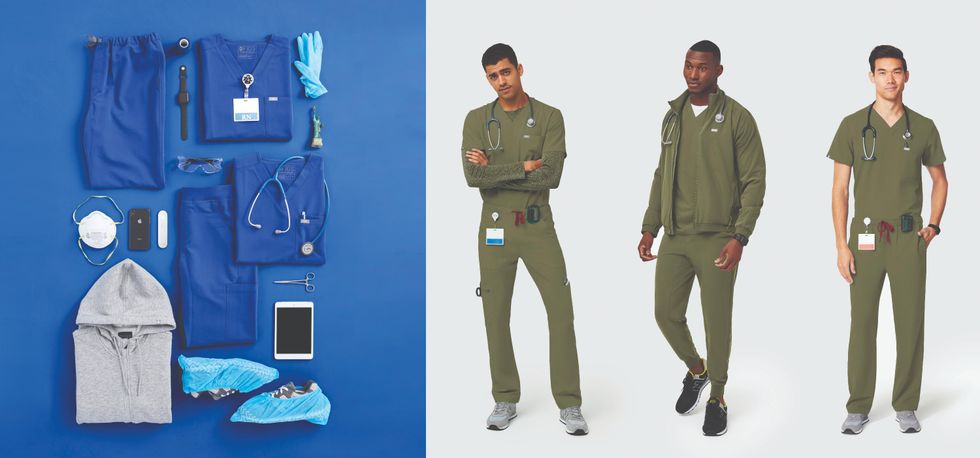'We've Branded an Unbranded Industry': FIGS Co-CEOs Trina Spear and Heather Hasson on Their Epic IPO
Favot is an award-winning journalist and adjunct instructor at USC's Annenberg School for Communication and Journalism. She previously was an investigative and data reporter at national education news site The 74 and local news site LA School Report. She's also worked at the Los Angeles Daily News. She was a Livingston Award finalist in 2011 and holds a Master's degree in journalism from Boston University and BA from the University of Windsor in Ontario, Canada.

Fashionable and comfortable medical scrub maker FIGS made history on multiple fronts when it made its Wall Street debut last month.
The Santa Monica company was likely the first led by two female CEOs and co-founders to go public; it was the first healthcare apparel company to go public, and it was the first company to make its IPO available on Robinhood.
And its performance beat expectations. Shares of FIGS jumped 36% to close at $30.02 after they priced at $22 each. They have since risen to $43.37 as of Thursday.
Co-CEOs and co-founders Trina Spear and Heather Hasson sat down with dot.LA to talk about how they went from selling their scrub sets out of their car in front of hospitals during shift changes to going public last month.
They discussed how the direct-to-consumer apparel company for health professionals surprised investors and how they wanted to make the IPO accessible to healthcare workers.

Heather, you got the idea for FIGS after you had coffee with a friend who was a nurse practitioner and were horrified when you realized she was working 16-hour days wearing uncomfortable, unflattering scrubs. Scrubs seem like a big jump from the upscale handbag company you were running at the time. Why was it about that moment that made you think this could become a successful business?
Heather Hasson: Any entrepreneur doesn't think, 'Oh my God, this is gonna be a successful company,' you know. I think my lens was, what problems can I solve and how do I make this world better and how do I make this world a place where I want to live in.
Healthcare professionals are the most incredible people in the world and they don't have gear, they don't have clothing that can help them perform better. And also, direct-to-consumer, they should be able to order at 2, 3 o'clock in the morning when they need to. They need their uniform to go to work.
In the beginning, Trina and I, we were selling out of my car in front of hospitals during the shift change. At that moment, you realize people want FIGS, they want your stuff.
I really do, I wake up every single day thinking about healthcare professionals and how do we support them, how do we empower them, how do we celebrate them.
Where does the name FIGS come from?
HH: It's a very simple answer. It's my favorite fruit.
How big is your team? Why did you choose L.A. as your HQ?
Trina Spear: We have about 250 people. And why did we choose L.A.? Heather is from here, born and raised.
What was that moment like for you as the first female CEOs and first female co-founders company to go public?
TS: We really felt like the IPO, this milestone, wasn't so much about us. It was really about the community. Coming out of this pandemic and having this be almost a symbol of everything that our healthcare professionals went through. We had 12 healthcare professionals on the podium with us to ring the bell. We had 60 of our healthcare professionals at our IPO. This was a really amazing moment for this community that's been through so much and now it's kind of coming out of it and we really feel like we're the brand to support them and show up for them every single day.
You partnered with Robinhood which allowed retail investors to buy stock before the debut on the open market. Why?
TS: I think for us, back to our broader mission of supporting healthcare professionals, we really did want to give them an opportunity to invest pre-IPO and Robinhood enabled us to do that. Normally, being able to invest pre-IPO is very much a Wall Street insider-type of thing. By partnering with Robinhood, we were able to give access to FIGS stock, having equity in this company, to our most important people, the people we serve -- our healthcare professionals, so that's why we did it.
What will you be doing with their windfall? Could we expect to see them acquire other companies? Will you be growing your footprint in L.A. or elsewhere?
TS: The real investment that we're looking to make is in product. And the second area is in our community, our community is the brand, the brand is our community and so how do we continue to give to this community that's so deserving of something better. And then data and technology is a huge area for us. We have a really robust set of data and technology capability. And what that enables us to do is, at the heart of it, understand our customers better. The more data we have, the more we understand, the more we can serve and support. How do we deepen our connection with this community? Data and scalable data enables us to do that.
Some investors have eschewed direct-to-consumer brands in recent years, I'm thinking of the mattress startup Casper's "lackluster" IPO performance. FIGS on the other hand, stock surged 36% in its debut. Why should people invest in your company?
TS: There's a big difference between us and really every other company and the big difference is that we've been able to balance both growth and sustainable profitability. If you look at even last year, we grew 140% year-over-year and $263 million in net revenue. No one thought that was possible. Every investor we met, no one thought a direct-to-consumer company that has 98% of their sales online direct-to-consumer could grow 140% to $263 million, we did $318 million in revenue in the last 12 months as of the first quarter. Nobody thought that was possible.
Why have you been able to do this?
TS: All these companies are so focused on digital marketing and they put all the money into Facebook and all the money into Google and they hope to make a return on that investment. And as they scale, their customer acquisition cost goes up.
What we've proven is that as we scale, we've been able to decrease our customer acquisition cost by 61% over the last two years because we never were reliant on Facebook and Google digital marketing. We actually built the brand the right way. The way in which a Nike or a Lululemon or Adidas built their brand, with actual people loving the product and loving the brand, not based on how I figured out the algorithm on Facebook. This is a huge, huge shift from how people thought that digitally native direct-to-consumer companies should grow. Everyone thought 'how do you crack the code on Facebook's algorithm'. No, actually you build a community around a profession, you build relationships with real people, you build a brand people love, you build a product people come back over and over and over again to buy. That's the hard way to build a company and that's what we've done.

It seems like this is a really niche market, do you have any plans to appeal to a wider customer base? Expand globally and into other uniform-wearing sectors?
TS: We actually don't view it as a niche market. I think many people do because they don't understand how many healthcare professionals there are, but this is a $12 billion industry in the United States. It's $79 billion globally and healthcare jobs are the fastest growing job segment in the country. We have a 2% market share in the U.S.
We think about our company as a lifestyle brand for the healthcare professional, so it's not just a top and a pant, it's also our under scrubs, our fleeces, our vests. We're outfitting healthcare professionals to work — at work, from work, head to toe, on shift and off shift. So it's all of these other things that we're doing and creating for our healthcare community and so we feel like we have a lot of runway, even just within the category that we're in.
At some point, we do feel like the uniform industry overall is broken and if there's any company that's going to disrupt that like we disrupted this industry bringing comfort and design and technical fabrication and functionality to the uniform industry overall, it would be FIGS, but you know, that is not in the near future.
Why should a medical professional buy FIGS? The price point is higher than other more traditional scrubs. On Amazon you can find a scrub top and scrub pants for $20 each, while your scrubs start at $38 for a top and $40 for pants. For lower-wage medical professionals like nursing assistants or medical students, this price point may be out of reach. Also, some might say that since you're going to be working in them every day and all the possible stains that may get on your scrubs, it's not worth it to buy high-end scrubs.
TS: If you look at our customer base, our customers make less than the average healthcare professional; 12% of our customers are students. Two-thirds of our customers make less than $100,000 a year and one-third, make less than $50,000 a year, within that two-thirds. So as much as we are a premium product, we are only about 15%-ish higher than the average scrub set. It's really important to us to serve all healthcare professionals and so really having an affordable, accessible product is one of core tenants here at FIGS that's really, really important.
You mentioned in your prospectus that it's a highly competitive market. How do you differentiate yourselves?
TS: The way in which the industry worked, is you had all these companies that were essentially licenses of other companies that sold to the retailer, and then the retailer sold to the end customer. But 85% of healthcare professionals buy their own uniforms.
We've branded an unbranded industry. And so what these companies really struggled with is that they didn't have that direct relationship [with the consumer]. They don't even know the names of their customer. The retailer is selling to the customer. That fundamental industry was broken, that structure was broken, that needed to be fixed and so that's what we've done.
We de-commoditized the commodity products, we went direct to consumer and then we built this community around this profession.
In 2020, FIGS had operating income of $57.9 million after a net operating loss of $300,000 in 2019. The 2020 active customer tally was 1.3 million, up from 600,000 in 2019. What was it about 2020 that made for such growth and profitability?
TS: This was happening prior to 2020. Essentially, we were profitable as of some point in 2019. But this is a trajectory that was long before COVID. We've grown the company every year by 100% year-over-year, so in terms of that following through to the bottom line, that was the trajectory we were on. It wasn't a COVID dynamic, if you will.
What do you keep in mind when you're designing products? Is it all about fashionability?
HH: it has to be really comfortable because you're in your scrubs for 16 hours sometimes 32 hours, so that is literally the design lens -- technical comfort. And we do not do anything that's not technical and super comfortable at the same time.
They're commuting to work, so they need a fleece, even a jacket over that and when they go to work, we're the first company to make jackets for the inside. We specifically make jackets for between 62 and 65 degrees. It's about the entire layering system. It's about what the healthcare professional wears 365, on the night shift, to and from work and when they wake up in the morning. That's never really been thought about and it should be because that's what healthcare professionals need.
Correction: An earlier this version of the story incorrectly referred to customer acquisition cost as cap. It was also updated to clarify the timeline in which FIGS raised $318M in revenue.
- FIGS Tops Off Banner Week for SoCal IPOs - dot.LA ›
- Jaanuu Medical Scrubs Brand Raises $75 Million - dot.LA ›
- MedTech Startup FIGS Is Being Sued By SPI - dot.LA ›
Favot is an award-winning journalist and adjunct instructor at USC's Annenberg School for Communication and Journalism. She previously was an investigative and data reporter at national education news site The 74 and local news site LA School Report. She's also worked at the Los Angeles Daily News. She was a Livingston Award finalist in 2011 and holds a Master's degree in journalism from Boston University and BA from the University of Windsor in Ontario, Canada.



 Image Source: Revel
Image Source: Revel
